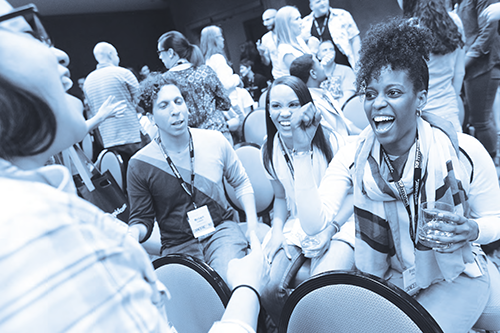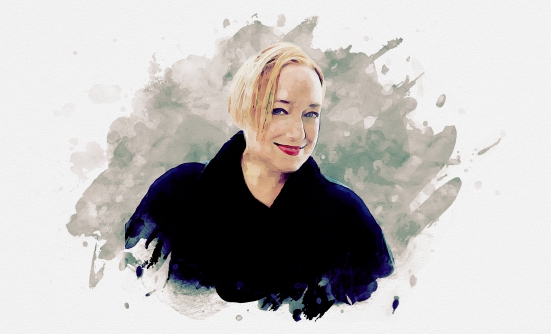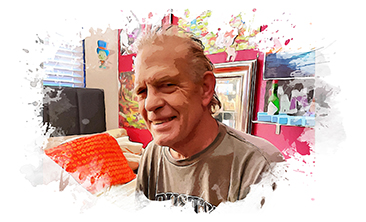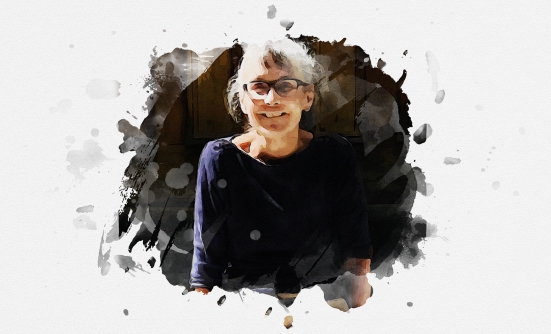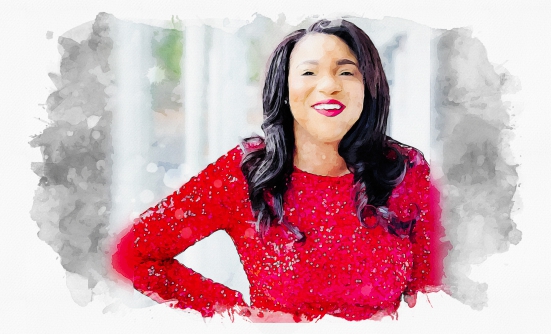Kelsey White is ready to “jump back into the acting pool,” having completed surgery and chemotherapy for stage IC ovarian cancer. She is currently working as a casting assistant in Louisiana.
“Being a 24-year-old woman, I was just starting to figure out what I want to do with my life, and cancer threw me off track. I took a break after my diagnosis, because acting involves aesthetics. I had gained 15 pounds, was bald, and was not feeling myself, but now I’m ready to segue back into the acting world,” Kelsey said.
With a last name of White, her porcelain skin, and her jet black hair, Kelsey has been fondly nicknamed Snow White and Wonder Woman. “I identified with this—my hair felt like my security blanket, and losing it was very hard for me, although I know it sounds silly, especially in light of the more important thing, that a cancer that is usually hard to catch was actually detected early,” she said.
Kelsey found comfort by going to church. “I didn’t grow up in a church, but I started going after my diagnosis. It made me more spiritual. I was struggling, and I felt I needed to fulfill something within myself,” she said. She also found Stupid Cancer while searching for information for young adults with cancer.
Her advice to young women with cancer: “Pay attention to your body. Learn your body, don’t micromanage yourself, but do question your doctors. Reach out to the cancer community when you are ready. And that’s key: when you are ready! It’s hard to do this by yourself.”
Jason Varounis was diagnosed at age 6 with medulloblastoma, a brain tumor. He used to wonder where his life would be now if he never had cancer.
He found himself feeling jealous, then depressed. Ultimately, he felt “despair,” he said.
“It’s impossible to predict the person that I would have otherwise become 20 years later. It is scary, and sometimes offensive, to consider that the cancer experience has benefits, and even worse to consider that those benefits might outweigh the costs. If I can despair over all the things I might have had without cancer, then I can just as easily rejoice over all the things I might not have without it,” he said.
So, Jason focuses on the positive things that cancer has taught him, such as compassion, humility, and perspective.
“My experience forced me to learn about diseases, treatments, anatomy, balancing bills, and planning schedules. Without it I might be an uneducated, irresponsible fool. My experience taught me willpower and perseverance. Without it I might be a lazy bum. My experience brought me love, and without it I might never be in a marriage so strong and full of understanding and equality. My wife, Dorienne, is also a cancer survivor (she has papillary thyroid cancer), and we most assuredly would never have found each other, otherwise,” he said.
“Now, I dare not consider what my life would be like, had I never had cancer,” he said. “I have invested too much from the experience, and it has become so much a part of me that to deny it is to deny myself.”
Scott Zilverberg was diagnosed with stage III colon cancer at age 30. He’s now 7 years past that frightening diagnosis and credits his physicians with being proactive and evaluating him right away.
Scott underwent chemotherapy, surgery, and radiation. He then received a colostomy bag for 7 months and had many staph infections. “I dropped from 168 pounds to 127 pounds in 17 days. I couldn’t walk,” he recalled.
He’s since had all moving parts “reconnected,” and he is still trying to “feel himself again.” Cancer never slowed Scott down, even when it should have, he said. “I was in very good shape when this happened, and it probably got me through it the first time. Even while I was in treatment, I worked out, but I made the mistake of not listening to my doctor after my last surgery. I didn’t take it easy, and I ended up with an incisional hernia that blew open. There was yet another surgery, another 11 more days of recovery,” he said.
His advice: “If you have unusual symptoms, go to the doctor! I was lucky. Mine did a colonoscopy right away, and this probably saved my life.”
Sharrel Paul noticed a mole on her lower back in 2012, which proved to be stage IIIC melanoma after a biopsy and a PET scan. She had 6 surgeries to remove the cancer, but new lesions kept appearing.
Among the treatment options, she had the chance to join a clinical trial with 2 cutting-edge immune therapies. Sharrel was a perfect candidate for a clinical trial that compared the use of the combination of Yervoy (ipilimumab) plus the new PD-1 inhibitor Opdivo (nivolumab) versus ipilimumab alone.
“It turns out I was on the control arm, ipilimumab alone, in this double-blind trial. But when my disease progressed, it was unblended, and I was allowed to start the PD-1 inhibitor….It’s been a year, and I’ve been doing well,” she reported. “Within the first 6 weeks of the combination, my tumors (in the abdomen/pelvic area) shrank significantly. This was a huge high! They kept shrinking for a few months longer, and they have been stable for the last 4 months.”
Her oncologist said she could continue the treatment even after the trial as long as her disease is stable and the side effects are minimal.
Sharrel thinks the best way to handle cancer is to “try to find something else to make you happy.” For her, this is pottery. Making pottery has become a substitute for her occupation as a massage therapist. “I can’t do that now. I can’t be on my feet longer than an hour at a time,” she said. “With pottery, I enjoy trying to be artistic.”
Nancie Beth Gulker had already lost her father to leukemia when her brother committed suicide in 2010. Just 6 months later, her mother died of lung cancer. How could things get worse? Breast cancer! At age 42, Nancie Beth was diagnosed only 1 year after losing her remaining family. The silver lining: it was stage IA, invasive ductal and invasive lobular carcinoma in the same breast, without nodal involvement—very treatable.
What Nancie Beth remembered as most disconcerting was the way her diagnosis was communicated. “I was told on a Friday afternoon over the phone by a partner of my physician, whom I had never met. She called and told me that my biopsy showed possible cancer. She was like, ‘I didn’t want you to worry all weekend. I saw the biopsy, and it’s cancer, but it looks treatable. You’ll hear more about it on Monday.’ Monday was when I was already scheduled to see my own doctor.”
“Since I now had no family, I thought, ‘Who do I call and tell?’” she recalled. “Friends are different from family. When you have surgical drains, it’s kinda hard to ask a friend for help.”
No longer having a mother to rely on, she was forced to learn an important lesson, she said. “If there’s a good thing about having cancer, it’s that it taught me that people want to help me. I am much better about asking for and accepting help now,” she said.
She sought a community among breast cancer support groups but found they weren’t a good fit. “Breast cancer tends to be a disease of older women, and not the right place for topics like, ‘When do I tell a new boyfriend I have cancer?’” she pointed out. Stupid Cancer, on the other hand, was a good fit. “This community became my family,” she said.
She finished treatment in 2012 and has since undergone 3 reconstruction surgeries, knee replacements, and bouts of cellulitis. “Yes, I learned to ask for help with these things!” she said. She blogs at www.breastcancerbattlescars.net.
Stephen Savage-Estrada was diagnosed with stage IV colon cancer at age 28. This was how he learned that Lynch syndrome was part of his family’s genetic makeup, and that his diagnosis may ultimately spare his siblings the same.
Involvement in the mesentery area (where the intestine attaches to the abdominal wall) meant he was not a candidate for surgical resection; however, chemotherapy shrank his tumor enough so he was eligible for the novel treatment called NanoKnife, which uses electricity to kill hard-to-reach cancer cells.
Although Stephen lost more than 60 pounds, he is now happy to be in the “watch and wait” period and is receiving maintenance therapy with Avastin (bevacizumab). He fights fatigue with Sativex (cannabidiol), which he also credits with helping to reduce his tumor. “I had been told the tumor was too large to shrink enough, but it happened,” he said.
Stephen told CONQUER, “It took 6 months to diagnose it. My doctors didn’t take my symptoms seriously. I finally told my primary care doctor I would not leave the office until I got a CT scan. My doctors have since apologized. I know they learned from me.”
The diagnosis dealt a major blow, he said, but finding the Colontown website helped him to connect with other people with his type of cancer. Having cancer created “guilt about not being able to take care of myself, to need my friends and family to cook for me, do my laundry and all. My whole family has fallen apart, but then reconstructed in a beautiful way. It’s been a journey, but I can see the goodness in it. It’s tough, but it’s doable,” Stephen said.





